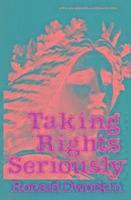
- Format
- Häftad (Paperback / softback)
- Språk
- Engelska
- Antal sidor
- 392
- Utgivningsdatum
- 1977-07-01
- Förlag
- Harvard University Press
- Illustrationer
- None
- Dimensioner
- 231 x 150 x 25 mm
- Vikt
- Antal komponenter
- 1
- Komponenter
- WORKSHEET
- ISBN
- 9780674867116
- 480 g
Taking Rights Seriously
With a New Appendix, a Response to Critics
- Skickas från oss inom 5-8 vardagar.
- Fri frakt över 249 kr för privatkunder i Sverige.
Passar bra ihop
De som köpt den här boken har ofta också köpt Courage To Be Disliked av Ichiro Kishimi, Fumitake Koga (häftad).
Köp båda 2 för 502 krKundrecensioner
Fler böcker av Ronald Dworkin
-
Religion utan gud
Ronald Dworkin
-
Law's Empire
Ronald Dworkin
-
Freedom's Law
Ronald Dworkin
-
Life's Dominion
Ronald Dworkin
Recensioner i media
The most important work in jurisprudence since H. L. .A. Hart's The Concept of Law and, from a philosophical point of view at least, the most sophisticated contribution to that subject yet made by an American writer... Dworkin's essays are brilliantly written ... [T]he book is remarkable in its unity and technical assurance. The New York Review of Books It is a rare treat --important, original philosophy that is also a pleasure to read. Dworkin argues vigorously, imaginatively and elegantly. The Yale Law Review In a series of beautifully written, mutually supportive essays, Dworkin applies the theory of rights or his own version of the theory to the case of judicial decision-making. The New Republic The most significant book oil philosophy of law in this decade and surely one of the more interesting ones of the century. Ethics Dworkin's writing launches a frontal attack on the two concepts, utilitarianism and legal positivism, that have dominated Anglo-American jurisprudence in the 20th century... Dworkins theories have created shock waves among jurisprudential scholars. Time Magazine
Övrig information
Ronald Dworkin was Frank Henry Sommer Professor of Law and Philosophy at New York University.
Innehållsförteckning
Introduction 1. Jurisprudence 2. The Model of Rules I 3. The Model of Rules II 4. Hard Cases 5. Constitutional Cases 6. Justice and Rights 7. Taking Rights Seriously 8. Civil Disobedience 9. Reverse Discrimination 10. Liberty and Moralism 11. Liberty and Liberalism 12. What Rights Do We Have? 13. Can Rights be Controversial? Appendix: A Reply to Critics Index
Du kanske gillar
-
Quicksilver
Callie Hart
Häftad -
Genocide Bad
Sim Kern
Häftad -
Trading Game
Gary Stevenson
Häftad -
Abundance
Ezra Klein, Derek Thompson
Trade Paperback


